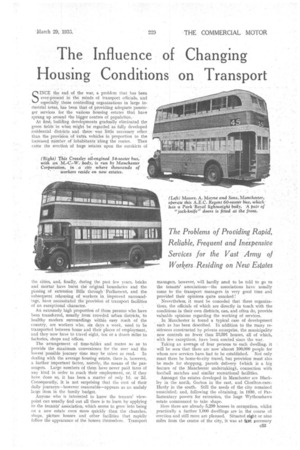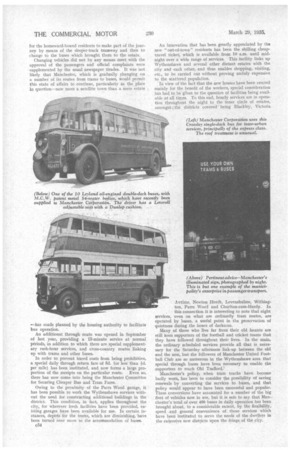The Influence of Changing Housing Conditions on Transport
Page 107

Page 108

If you've noticed an error in this article please click here to report it so we can fix it.
S. INCE the end of the war, a problem that has been ever-present in the minds of transport officials, and especially those controlling organizations in large industrial areas, has been that of providing adequate passenger services for the various housing estates that have sprung up around the bigger centres of population. At first, building developments gradually eliminated the green fields in what might be regarded as fully developed residential districts and• there was little necessary other -than the provision of extra vehicles in proportion to the increased number of inhabitantsalong the routes. Then came the erection of huge -estates' upon the outskirts of the cities, and, finally, during the past few years, bricks and mortar .have burst the original boundaries and the passing Of 'extëh'sion"Bills -thrOUgh 'Parliament, and the subsequent rehousing. of workers. in. improved surround
• ings, have necessitated the proVisiOn of tranSport facilities of an exceptional character.
An extremely. high proportion of those persons who. have been transferred, usually from crowded 'urban districts, to
• healthy Modern surroundings within easy reach of the country, are workers who, six days a week, need to be transported between home andtheir places of emploYinent, and they now have to travel eight, "ten Or a dozen nine's to 'factories, shops and Offices. '
The 'arrangement •of time-tables and routes so as to provide the maximum convenience for the user and the
lowest'possible journey time inay be taken as read. In dealing with th:e average housing estate, there is, however, a farther important factor, namely, the means of the passengers. Large numbers of them have neverpaid fares Of any kind in order to ,reach their einploynient, or,' if they have done so, it has been a matter of only Id. or 2d. Consequently,it is not surprising that the cost of their daily journeys--bowever reasonable—appears as an unduly large item in the family budget.
Anyone who is interested to know the tenants' viewpoint can usually find out all there is to learn by applying tri the tenants' association, which seems to grow into being on a new estate even more quickly than the churches, shops; picture houses and other facilities that rapidly follow the appearance of the houses themselVes. Transport managers, however, will hardly need to be told to go to the tenants' associations—the associations have usually come to the transport managers in very good time and provided their opinions quite unasked !
Nevertheless, it must he conceded that• these organizations, the officials of which are directly in touch with the conditions in their own districts, can, and often do, provide valuable opinions regarding the working of services.
In Manchester is found a typical case of development such as has been described. In addition to the many residences constructed by private enterprise, the municipality now controls no fewer than 23,591 houses, all of which, with few exceptions, have been erected since the war.
Taking an average of four persons to each dwelling, it will be seen that there are now almost 100,000 people for whom new services have had to be established. Not only must there be home-to-city travel, but provision must also be made for shopping, parcels delivery (which is a big feature of the Manchester undertaking), Connection with football matches and similar recreational facilities.
Amongst the estates developed in Manchester are Blackley in the north, Gorton in the east, and Chorlton-eumHardy in the south. Still the needs of the city remained unsatisfied, and, following the obtaining, in 1930, of Parliamentary powers for extension, the huge Wythenshawe estate commenced to take shape.
Here there are already 5,299 houses in occupation, whilst practically a further 1,000 dwellings are in the course of erection and still more are planned. Situated eight or nine -miles from the centre of the city, it was at faun; necessary c53
for the homeward-bound residents to make part of the journey by means of the sleeper-track tramway and then to change to the buses which brought them to the estate.
Changing vehicles did not by any means meet with the approval of the passengers and official complaints were supplemented by the usual newspaper tirades. It was not likely that Manchester, which is gradually changing on a number of its routes from trams to buses, would permit this state of affairs to continue, particularly as the place in question—now more a satellite town than a mere estate —has roads planned by the housing authority to facilitate bus operation.
An additional through route was opened in September of last yea!, providing a 15-minute service at normal periods, in addition to which there are special supplementary rush-hour services, and cross-country routes linking up with trams and other buses.
In order to prevent travel costs from being prohibitive, a special daily through return fare of 8d. (or less .than id. per mile) has been instituted, and now forms a large proportion of the receipts on the particular route. Even so, there has now come into being the Manchester Committee for Securing Cheaper Bus and Tram Fares.
Owing to the proximity of the Parrs Wood garage, it has been possible to work the Wythenshawe services without the need for constructing additional buildings in the district. This condition, in fact, applies throughout the city, for wherever fresh facfies have been provided, existing garages have been available for use. In certain instances, depots for the trains, which are diminishing, have been turned over more to the accommodation of buses.
c54 An innovation that has been greatly appreciated by the new " out-of-town " residents has been the shilling cheaptravel ticket, which is available from 10 a.m. until midnight over a wide range of services. This facility links up Wythenshawe and several other distant estates with the city and each other, and thus enables shopping, visiting, etc., to he carried out without proving unduly expensive to the scattered population. In view of the fact that the new houses have been erected mainly for the benefit of the workers, special consideration has had to be giVen to the question of facilities being available at all times. To this end, hourly services are in operation throughout the night to the inner circle of estates,
amongst the districts covered.. being Blacklcy, Victoria
A vefine, Newton Heath, Levenshulme, Withington, Parrs Wood and Chorlton-cum-Hardy. In this connection it is interesting to note that night services, even on what are ordinarily tram routes, are operated by buses, a useful point in the preservation of quietness during the hours of darkness.
Many of those who live far from their old haunts are still keen supporters of the football and cricket teams that they have followed throughout their lives. In the main, the ordinary scheduled services provide all that is necessary for the Saturday afternoon link-up between the old and the new, but the followers of Manchester United Football Club are so numerous in the Wythenshawe area that special through buses have been necessary to enable the supporters to reach Old Trafford.'
Manchester's policy, when tram tracks have become badly worn, has been to consider the possibility of saving renewals by converting the services to buses, and that policy would appear to have been successful and popular. These conversions have accounted for a number of the big fleet of vehicles now in use, but it is safe to say that Manchester's total of over 400 buses in daily operation has been brought about, to a considerable extent, by the flexibility, speed and general convenience of those services which have been instituted to serve the needs of the dwellers in the extensive new districts upon the fringe of the city.




































































































































































